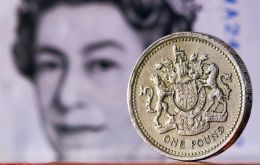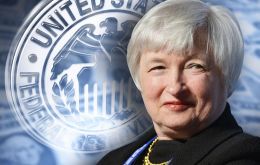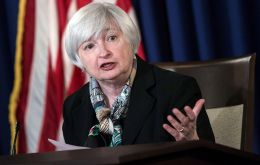MercoPress. South Atlantic News Agency
Tag: Federal Reserve
-
Monday, June 13th 2016 - 07:36 UTC
Sterling drops to a two-month low as jittery investors shift to safer assets

The British pound dropped to a two-month low and the yen rallied Monday as jittery investors shifted into safer assets on worries about Britain's possible exit from the European Union. The flight to lower-yielding investments came as Asian stock markets plunged, with dealers awaiting meetings this week of the US and Japanese central banks.
-
Thursday, June 9th 2016 - 08:50 UTC
Yellen says Brexit 'repercussions' would be considered in Fed’s meeting next week

United Stated Federal Reserve chair Janet Yellen said a UK vote to leave the European Union could have “significant economic repercussions”. In a speech this week, she said a Brexit was one factor that the central bank would consider when deciding whether to raise interest rates. The Fed next meets on 14-15 June.
-
Tuesday, June 7th 2016 - 23:57 UTC
Rate hikes likely, but some reports remain 'disappointing', admits Fed chief Yellen

Reserve Chair Janet Yellen said on Monday that interest rate hikes are likely on the way because “positive economic forces have outweighed the negative” for the United States now that risks from earlier this year have diminished.
-
Thursday, May 19th 2016 - 12:02 UTC
Minutes show Fed could be ready for an interest rate in June

Federal Reserve officials consider the United States economy could be ready for another interest rate increase in June, according to the minutes from the central bank's April policy meeting released on Wednesday. Most participants in the policy-setting committee's April 26-27 meeting said they wanted to see signs that economic growth was picking up in the second quarter and that employment and inflation were firming, the minutes showed.
-
Wednesday, May 18th 2016 - 11:32 UTC
US economy good news: inflation reaches 1.1% and housing starts rise 6.6%

US consumer prices rose at their fastest pace in three years in April as energy prices climbed, figures show. The Labor Department's Consumer Price Index rose 0.4% last month, the biggest one-month increase since February 2013.
-
Thursday, April 28th 2016 - 07:22 UTC
Fed leaves rates unchanged; expectations over an increase move to June

The U.S. Federal Reserve did what many expected on Wednesday as it left its key interest rate range unchanged. The central bank maintained its overnight lending rate for banks at a target range of between 0.25 and 0.50% where it has been since it was boosted from near zero back in December. Expectations now have moved to the two-day meeting on 14/15 June.
-
Sunday, April 3rd 2016 - 07:43 UTC
US economy gains confidence: 215.000 more jobs in March and 1.4% growth in fourth quarter
The US economy added 215,000 jobs in March, a little less than it did in February when 242,000 jobs were created. The unemployment rate has risen to 5% from 4.9%, which was an eight-year low, but the Labor Department said more Americans were finding jobs, which suggested a sign of confidence in the US economy. In effect this follows the report on the US economy which grew at an annualized rate of 1.4% in the fourth quarter of 2015s.
-
Wednesday, March 30th 2016 - 08:23 UTC
Yellen says the Fed will 'proceed cautiously' and in no hurry to raise interest rate

Federal Reserve Chair Janet Yellen said on Tuesday that the Fed still envisions a gradual pace of interest rate increases in light of global pressures that could weigh on the economy. Yellen did not specify a timetable for further hikes to follow the Fed's rate increase in December from record lows. She said the risks to the United States remain limited but cautions that assessment is subject to “considerable uncertainty.”
-
Friday, March 18th 2016 - 05:49 UTC
Fed cautious on global economy uncertainties leaves rates unchanged: markets react positively

US markets rose on Wednesday, following the decision by the Federal Reserve to keep interest rates unchanged and a statement indicating the rate would only rise twice in 2016. The Dow Jones industrial average climbed 79.64 points to 17,331.17. The S&P 500 gained 11.68 points to 2,027.61, while the tech-focused Nasdaq index was up 35.30 at 4,763.97.
-
Thursday, February 11th 2016 - 05:57 UTC
Fed warns about uncertainty in China and tightening financial markets

Tightening financial conditions driven by falling stock prices, uncertainty over China and a global reassessment of credit risk could throw the US economy off track from an otherwise solid course, Federal Reserve Chair Janet Yellen cautioned in a prepared testimony to Congress on Wednesday.
